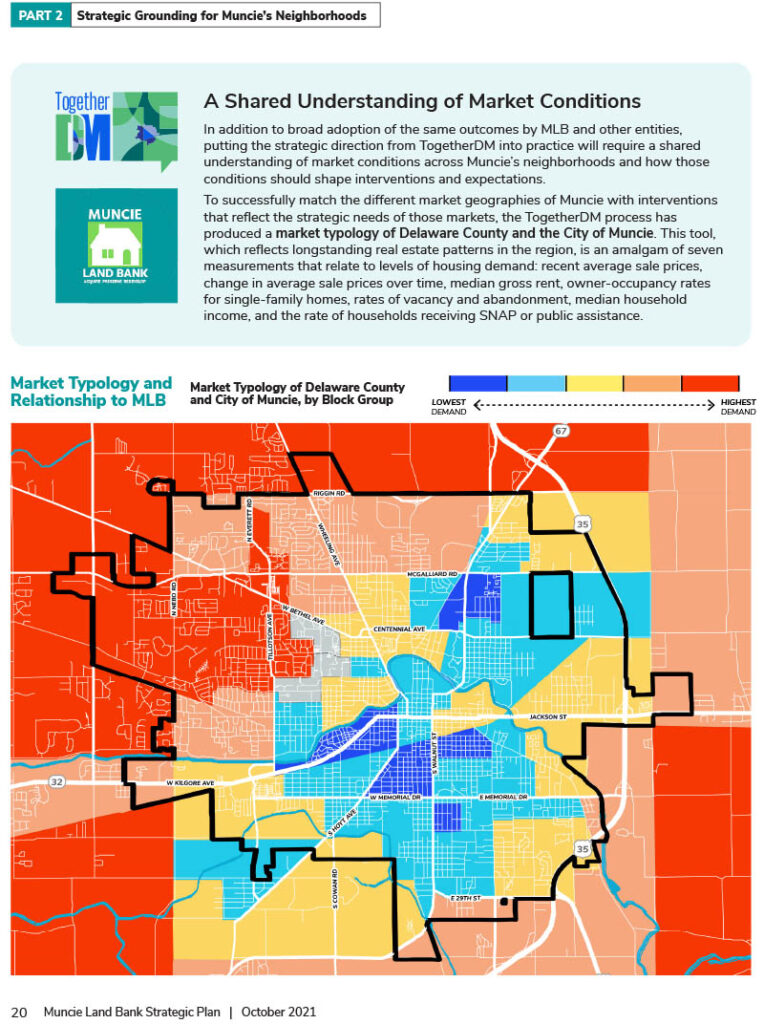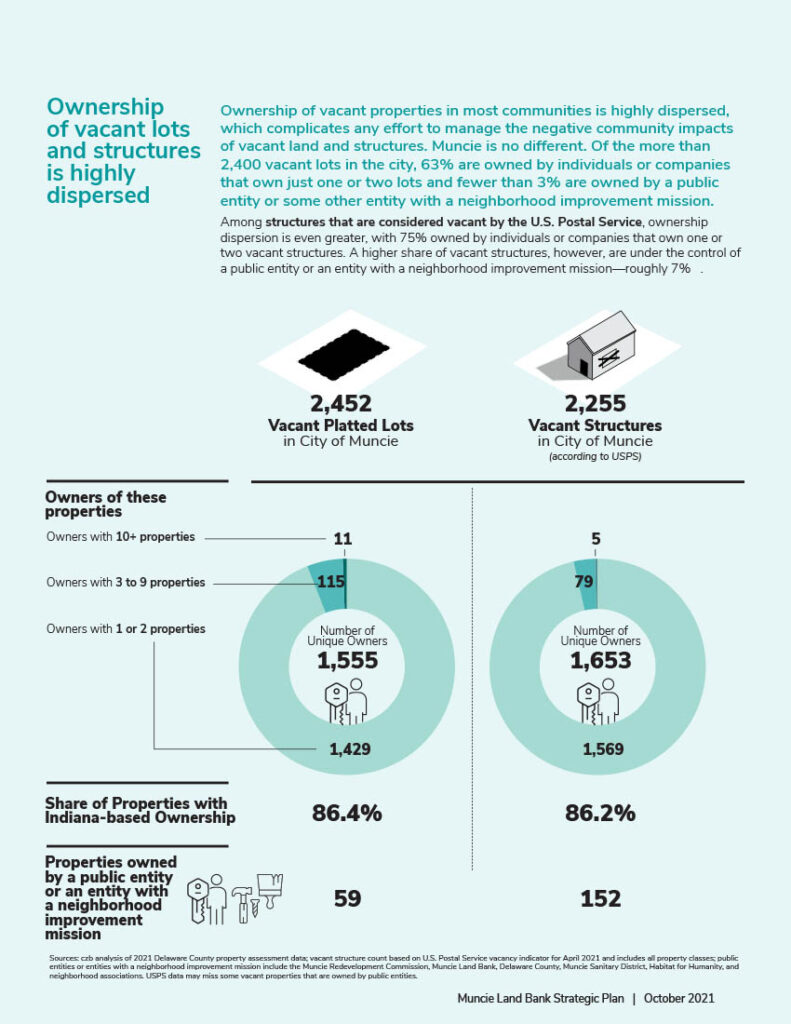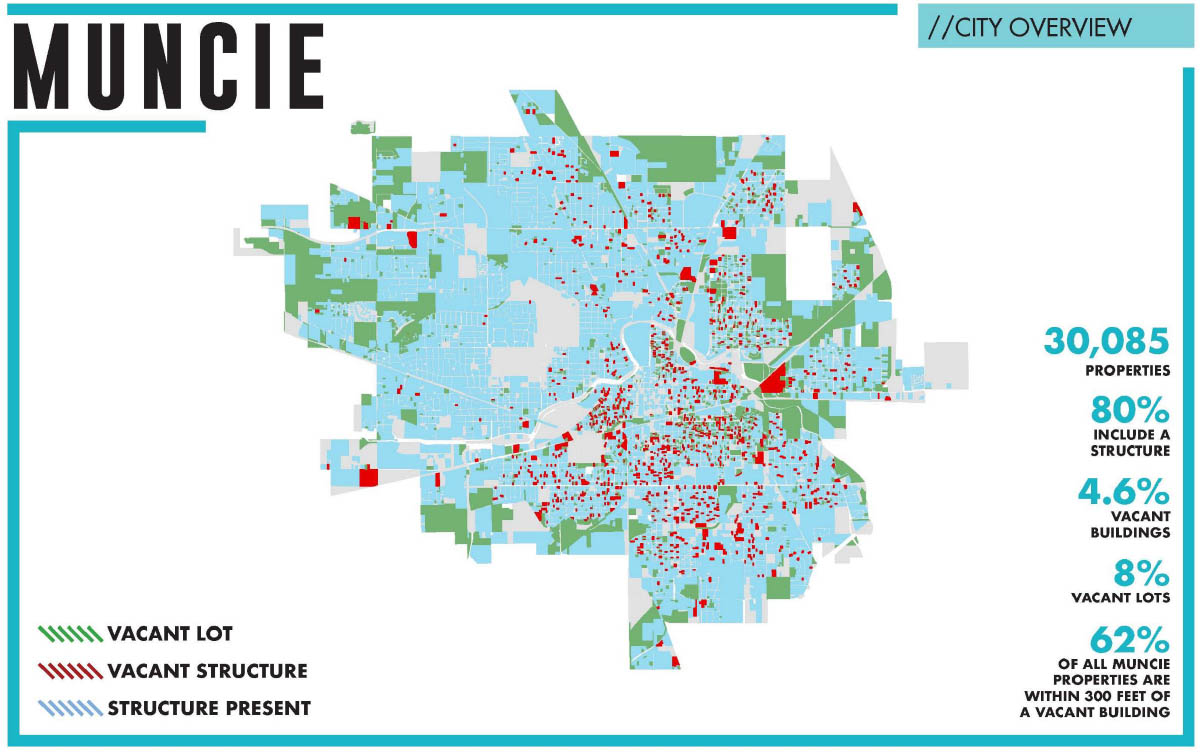In the midst of a nationwide housing crisis exacerbated by rising rents, aging infrastructure and neglectful property management, the Muncie Land Bank emerges as an important tool for communities grappling with the blight of vacant, abandoned and dilapidated properties. These derelict structures not only mar the landscape, but also undermine the sense of safety, stability and community pride vital to neighborhood well-being. Against this backdrop, the Muncie Land Bank stands as an organization with unique abilities to fight against urban decay and disinvestment, offering a multifaceted approach to address the root causes of blight and revitalize neighborhoods.
The Challenges
Imagine strolling down your street in Muncie, passing by houses with mattresses strewn across the front yard, broken windows, and a revolving door of renters without many quality options. Further down, a once-charming home now stands forlorn, with weeds engulfing the yard and a tree bursting through the roof. These scenes are all too familiar for many hard-working residents who witness firsthand the consequences of absentee landlords and neglectful property owners.
Despite their best efforts to improve their neighborhoods, residents find themselves powerless in the face of rampant disinvestment and decay. The influx of investors, both local and international, has only worsened the situation, with many prioritizing profits over community well-being. Consequently, both banks and residents hesitate to invest in home improvements, perpetuating a vicious cycle of neglect and decline.

A study done in 2017 found there to be approximately 2,400 vacant lots, 1,300 vacant structures and 750 blighted structures in Muncie. The external costs of vacant, abandoned and deteriorating properties are far reaching: decreasing the property values of adjacent properties, decreasing property-tax revenues, as well as increasing costs for police and public safety, local government code enforcement, and more. In fact, these properties cost Muncie and Delaware County millions of dollars in lost tax revenue per year. The City of Muncie pays for the effects of vacant properties through code enforcement and public safety. Residents of Muncie also pay, as the value of land around abandoned property is depressed by nearly 15%.
The sheer scale of the problem makes it difficult for the Delaware County government to address this challenge in a more targeted or nuanced manner. The current approach of auctioning off properties through tax lien auctions, while intended to recoup lost tax revenue and mitigate the burden on taxpayers, inadvertently contributes to the perpetuation of blight and decay in communities like Muncie. In many cases, the properties sold through these auctions end up in the hands of buyers or speculators who may lack the necessary expertise or commitment to rehabilitate them effectively. Without proper vetting or consideration of the potential impact on the community, these buyers may prioritize short-term profits over the long-term health and vitality of neighborhoods. As a result, properties continue to deteriorate, contributing to a cycle of neglect that further burdens local residents and authorities.
Between 2011 and 2021, a staggering 5,848 unique properties were auctioned by the county for failure to pay taxes. On average, these properties were listed in the tax sale 2.8 times, with over half listed more than once. Alarmingly, 32% of properties were sold two or more times during this period, indicating a recurring cycle of neglect and mismanagement.
In each of the last three years, approximately 600 properties have entered the county tax foreclosure sale. Alarmingly, around 400 of these properties did not sell each year, left to deteriorate further in a cycle of neglect. Meanwhile, the city faces approximately 60 unsafe-building hearing cases monthly, with only a third of owners appearing at these hearings. Tax delinquency, building code violations and absentee owners characterize many of these abandoned properties, imposing significant costs on citizens in terms of lost tax revenue and diminished quality of life.
Land Banking: A Tool for Muncie and Delaware County
Enter the Muncie Land Bank, a pioneering initiative dedicated to reclaiming and repurposing distressed properties for the betterment of the community. At its core, land banking offers a strategic approach to combating blight by acquiring problem properties, assuming ownership, and leveraging them as assets for community revitalization. By serving as a responsive local owner, the land bank ensures that these properties are secured, maintained and free from blight. Moreover, by increasing the supply of available housing, the land bank mitigates the risk of squatting and stimulates investment in neglected neighborhoods.
What the Land Bank Does
 Title Acquisition: A cornerstone of the land bank’s strategy is acquiring properties through various channels, including governmental agreements, donations and direct purchases. Many of these properties are tax delinquent and burdened by liens, making them undesirable on the open market. Through strategic partnerships with entities like the Muncie Redevelopment Commission and the Delaware County commissioners, as well as donations from organizations like Habitat for Humanity, the land bank secures properties that would otherwise languish in neglect.
Title Acquisition: A cornerstone of the land bank’s strategy is acquiring properties through various channels, including governmental agreements, donations and direct purchases. Many of these properties are tax delinquent and burdened by liens, making them undesirable on the open market. Through strategic partnerships with entities like the Muncie Redevelopment Commission and the Delaware County commissioners, as well as donations from organizations like Habitat for Humanity, the land bank secures properties that would otherwise languish in neglect.
Property Management: Once acquired, the land bank takes proactive measures to address safety concerns, clear encumbrances and prevent further deterioration. This includes securing properties, maintaining them and negotiating with lienholders to resolve outstanding debts. By actively managing these properties, the land bank ensures that they remain assets rather than liabilities for the community.
Rehabilitation and Repurposing: The ultimate goal of the Muncie Land Bank is to find sustainable reuses for acquired properties, thereby revitalizing neighborhoods and creating opportunities for affordable housing. Unlike the indiscriminate approach of tax lien auctions, the land bank carefully vets individuals and organizations seeking to acquire property from it. This vetting process ensures that properties are transferred to parties committed to rehabilitating or repurposing them for the benefit of the community.
Moreover, the land bank utilizes deeds with restrictions to hold buyers accountable for their stated purposes. These restrictions legally bind buyers to fulfill their commitments to rehabilitate or repurpose the properties they acquire. Should a buyer fail to follow through on their obligations, the land bank retains the ability to reclaim the property, ensuring that it remains a productive asset for community revitalization efforts.
In addition to individual property sales, the land bank strategically assembles clusters of properties to facilitate medium-scale development projects. By coordinating with local developers, community organizations and other stakeholders, the land bank maximizes its impact on neighborhood revitalization. Through these initiatives, the land bank not only addresses blight and disinvestment, but also fosters sustainable growth and renewal in Muncie’s communities.
Since its inception, the Muncie Land Bank has made significant strides in reclaiming and repurposing distressed properties for the benefit of the community. Despite operating on a shoestring budget primarily funded by local foundations, the land bank has acquired 85 properties and sold 61, with plans to further expand its impact in the coming years. By harnessing the power of land banking and fostering collaboration with stakeholders, the Muncie Land Bank remains steadfast in its commitment to revitalizing neighborhoods, fostering community pride, and creating a brighter future for all residents.






